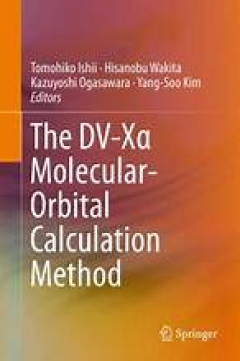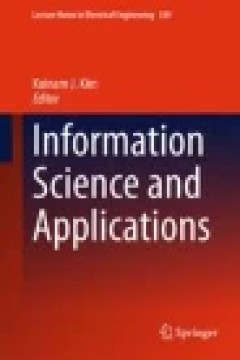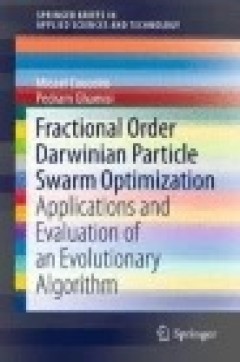Filter by

The DV-Xα Molecular-Orbital Calculation Method
This multi-author contributed volume contains chapters featuring the development of the DV-Xα method and its application to a variety of problems in Materials Science and Spectroscopy written by leaders of the respective fields. The volume contains a Foreword written by the Chairs of Japanese and Korea DV-X alpha Societies. This book is aimed at individuals working in Quantum Chemistry.
- Edition
- 1
- ISBN/ISSN
- 978-3-319-11185-8
- Collation
- X, 361, 146 b/w illustrations, 59 illustrations in colour
- Series Title
- -
- Call Number
- -

Information Systems Design and Intelligent Applications: Proceedings of Third…
The third international conference on INformation Systems Design and Intelligent Applications (INDIA – 2016) held in Visakhapatnam, India during January 8-9, 2016. The book covers all aspects of information system design, computer science and technology, general sciences, and educational research. Upon a double blind review process, a number of high quality papers are selected and collected i…
- Edition
- -
- ISBN/ISSN
- 978-81-322-2756-4
- Collation
- XVIII, 669
- Series Title
- -
- Call Number
- 004 INF

Information Systems Design and Intelligent Applications: Proceedings of Third…
The third international conference on INformation Systems Design and Intelligent Applications (INDIA – 2016) held in Visakhapatnam, India during January 8-9, 2016. The book covers all aspects of information system design, computer science and technology, general sciences, and educational research. Upon a double blind review process, a number of high quality papers are selected and collected i…
- Edition
- -
- ISBN/ISSN
- 978-81-322-2753-3
- Collation
- XX, 753
- Series Title
- -
- Call Number
- 004

Information Systems Design and Intelligent Applications: Proceedings of Third…
The third international conference on INformation Systems Design and Intelligent Applications (INDIA – 2016) held in Visakhapatnam, India during January 8-9, 2016. The book covers all aspects of information system design, computer science and technology, general sciences, and educational research. Upon a double blind review process, a number of high quality papers are selected and collected i…
- Edition
- -
- ISBN/ISSN
- 978-81-322-2750-2
- Collation
- XX, 767
- Series Title
- -
- Call Number
- 004 INF

Information Systems Design and Intelligent Applications: Proceedings of Secon…
The second international conference on INformation Systems Design and Intelligent Applications (INDIA – 2015) held in Kalyani, India during January 8-9, 2015. The book covers all aspects of information system design, computer science and technology, general sciences, and educational research. Upon a double blind review process, a number of high quality papers are selected and collected in the…
- Edition
- -
- ISBN/ISSN
- 978-81-322-2249-1
- Collation
- XXX, 889
- Series Title
- -
- Call Number
- 004 INF

Information Systems Design and Intelligent Applications: Proceedings of Secon…
The second international conference on INformation Systems Design and Intelligent Applications (INDIA – 2015) held in Kalyani, India during January 8-9, 2015. The book covers all aspects of information system design, computer science and technology, general sciences, and educational research. Upon a double blind review process, a number of high quality papers are selected and collected in the…
- Edition
- -
- ISBN/ISSN
- 978-81-322-2246-0
- Collation
- XXX, 877
- Series Title
- -
- Call Number
- 004 INF

Information Science and Applications
This proceedings volume provides a snapshot of the latest issues encountered in technical convergence and convergences of security technology. It explores how information science is core to most current research, industrial and commercial activities and consists of contributions covering topics including Ubiquitous Computing, Networks and Information Systems, Multimedia and Visualization, Midd…
- Edition
- -
- ISBN/ISSN
- 978-3-662-46577-6
- Collation
- XVIII, 1112
- Series Title
- -
- Call Number
- 004 INF

Information Processing in Cells and Tissues: 10th International Conference, I…
This book constitutes the proceedings of the 10th International Conference on Information Processing in Cells and Tissues, IPCAT 2015, held in San Diego, CA, USA, in September 2015. The 19 papers presented in this volume were carefully reviewed and selected from 22 submissions. They were organized in topical sections named: biochemical information processing; collective and distributed behavior…
- Edition
- -
- ISBN/ISSN
- 978-3-319-23107-5
- Collation
- VIII, 233
- Series Title
- -
- Call Number
- 004 INF

International Symposium on Mathematics, Quantum Theory, and Cryptography Pro…
This open access book presents selected papers from International Symposium on Mathematics, Quantum Theory, and Cryptography (MQC), which was held on September 25-27, 2019 in Fukuoka, Japan. The international symposium MQC addresses the mathematics and quantum theory underlying secure modeling of the post quantum cryptography including e.g. mathematical study of the light-matter interaction mod…
- Edition
- -
- ISBN/ISSN
- -
- Collation
- -
- Series Title
- -
- Call Number
- -

Fractional Order Darwinian Particle Swarm Optimization
This book examines the bottom-up applicability of swarm intelligence to solving multiple problems, such as curve fitting, image segmentation, and swarm robotics. It compares the capabilities of some of the better-known bio-inspired optimization approaches, especially Particle Swarm Optimization (PSO), Darwinian Particle Swarm Optimization (DPSO) and the recently proposed Fractional Order Darwin…
- Edition
- -
- ISBN/ISSN
- 978-3-319-19635-0
- Collation
- X, 75 pages
- Series Title
- SpringerBriefs in Applied Sciences and Technology
- Call Number
- -
 Computer Science, Information & General Works
Computer Science, Information & General Works  Philosophy & Psychology
Philosophy & Psychology  Religion
Religion  Social Sciences
Social Sciences  Language
Language  Pure Science
Pure Science  Applied Sciences
Applied Sciences  Art & Recreation
Art & Recreation  Literature
Literature  History & Geography
History & Geography